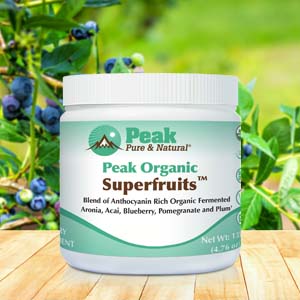Get Easy Health Digest™ in your inbox and don’t miss a thing when you subscribe today. Plus, get the free bonus report, Mother Nature’s Tips, Tricks and Remedies for Cholesterol, Blood Pressure & Blood Sugar as my way of saying welcome to the community!
The real reason fiber keeps disease away

Health professionals have long praised the benefits of fiber for bowel regularity. So the fact that fiber is essential to a healthy gut is no surprise.
However, we’re learning more every day about the central role our gut plays in many other aspects of our health — including how we age and our risks for heart problems, dementia, arthritis and even anxiety and depression.
But let’s be honest, most of us don’t get enough fiber in our diets to reap its disease-fighting potential.
A study by a small group of scientists would like to do something about that — and has brought to light yet another reason for us to take fiber more seriously…
Insoluble fiber’s beneficial plant “bioactives”
“People understand the need for fiber and how it relates to gut health — an area of wellness that is becoming increasingly important as scientific research continues to reveal its impact on overall health and wellbeing,” says Dr. Joanne Slavin.
Dr. Slavin teaches in the College of Food, Agricultural and Natural Resources at the University of Minnesota, and co-authored a study at the University of Minnesota focusing on the health benefits of bioactives.
Bioactives are plant compounds that have been linked to lower incidence of cardiovascular disease, cancer and Type 2 diabetes. In other words, they offer potential health benefits far beyond those traditionally attributed to fiber.
For research recently published in the journal Nutrients, Dr. Slavin and her team scoured the available literature on the health benefits of bioactives in plant sources of insoluble fiber — the kind of fiber that helps bulk up stool and promotes movement through your digestive system.
They found a variety of plant foods, including fruits, vegetables, legumes, nuts, seeds and whole grains contain insoluble dietary fiber, and each source contains unique bioactives that support health in different ways, including:
Quercetin: Known to support cellular health and function and inhibit the production of proteins that trigger inflammation, quercetin is found in a range of fruits and vegetables. However, apples and pears top the list. An average apple of 150 grams can contain up to 10 mg. of quercetin. A ten-year study showed those who ate the most white fruits and vegetables were 52 percent less likely to suffer stroke.
Resveratrol: A superstar nutrient in anti-aging research, this powerful antioxidant is also known for supporting longevity, heart health, muscle mass, slowing brain aging and even relieving arthritis pain and disease progression. It’s found abundantly in grapes, peanuts, dark chocolate, cranberries, blueberries and red wine.
Catechins: The dominant polyphenol in green tea, this antioxidant compound is also found in apricots, broad beans, black grapes, strawberries and wine. From lowering blood pressure to fighting cancer, it’s a “don’t miss” nutrient.
Anthocyanins: Found in fruits and vegetables with blue and purple pigments (like berries), this group of polyphenol antioxidants has a strong effect on cellular inflammation. Studies have linked anthocyanins with benefits that affect cardiovascular function, risk of Parkinson’s disease, lung function, a strong immune system, slower aging, improved control over obesity and vision loss.
Lutein: Best known for supporting sight, this “eye” antioxidant’s benefits go far beyond vision health, helping to slow cognitive decline, switch off stress, guard the heart and promote healthier aging. You’ll find it in green leafy veggies, eggs, sweet potatoes, carrots and asparagus.
Lycopene: Found abundantly in tomatoes and in watermelon, papaya, asparagus and red cabbage, lycopene supports prostate health, artery function and balances cholesterol levels.
Beta-Carotene: Another sight-supporting nutrient, this biochemical pigment is chock full of benefits including prostate support, cholesterol lowering and guarding against hardening of the arteries due to buildup. Look for it in leafy greens, sweet potatoes, cantaloupe, winter squash and more…
Get your share of plant fiber’s fantastic bioactive compounds
Unfortunately, according to Jan-Willem Van Klinken, co-author of the study and senior vice president of medical, scientific, and regulatory affairs for Brightseed, “The suggestion to eat more fruits and vegetables isn’t a novel idea, but it’s something most people still struggle to do.”
That’s why the study authors suggest that fiber-fortified foods could be developed to enhance accessibility to bioactive compounds. Food production byproducts such as peel, hulls, pulp or pomace are generally high in fiber and bioactives. And they offer unique nutritional value from sustainable sources.
However, they acknowledge that further research is required to identify extraction and processing methods that preserve and optimize bioactive compounds.
But if you want my take on that, I say get serious about adding more fiber to your diet.
We know the story of what happens when foods are processed. The very act of processing strips essential nutrients, that even when fortified (added back in) just don’t possess the nutritional synergy the whole food in its original form does.
When you eat your apple, enjoy the peel. Embrace the pulp in your orange juice and the tasty pomace from eating cool, sweet grapes. Take advantage of beans and legumes that can get you halfway to 30 grams of fiber a day.
It will do wonders for your gut and ultimately your whole-body health.
Editor’s note: There are perfectly safe and natural ways to decrease your risk of blood clots including the 25-cent vitamin, the nutrient that acts as a natural blood thinner and the powerful herb that helps clear plaque. To discover these and other secrets of long-lived hearts, click here for Hushed Up Natural Heart Cures and Common Misconceptions of Popular Heart Treatments!
Sources:
Research Brief: U of M study suggests even more reasons to eat your fiber — Eureka Alert
Beyond Insoluble Dietary Fiber: Bioactive Compounds in Plant Foods — Nutrients
Your Go-To Insoluble Fiber Foods List for Better Digestion — Taste of Home
We find nature’s answers to health — Brightseed















